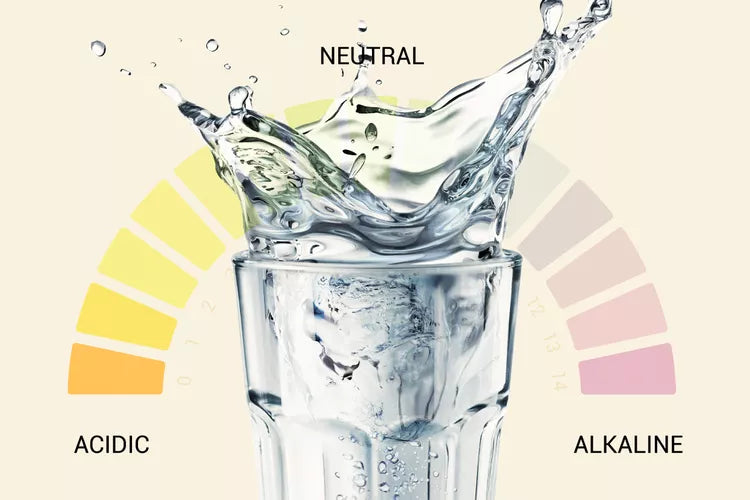The Acid-Base Balance
The acid-base balance of the body determines how healthy or sick you are.
What is the acid/base balance, and why is it crucial for our health?
Our diet contains acid-forming and alkaline substances (bases). For good health, a proper balance between acids and bases is required. This is referred to as a neutral pH value of the body (between 7.1 and 7.5). Due to the prevalence of modern diets high in meat, fats, and sugar (acid-forming) and low in vegetables and fruits (alkalizing), many people suffer from a chronically disturbed acid/base balance.
The body will always attempt to restore a disrupted balance by binding excess acids to minerals (including calcium, magnesium, iron, lime, sodium, and zinc) and neutralizing them. As long as there are enough base-forming nutrients in the body, the excess acids stored in connective and fatty tissues during the day can be eliminated through the kidneys, skin, and lungs at night.
If the diet lacks sufficient minerals, the body will deplete the mineral reserves in bones, skin, and internal organs, leading to eventual deficiencies. The body eventually loses its ability to correct the disrupted acid/base balance and becomes chronically acidic. This is known as acute acidosis.
Acute acidosis can also result from other causes, such as poor nutrition, impaired lung function (retaining too much carbon dioxide), metabolic disorders (excessive acid production, as in diabetes), or kidney abnormalities (excreting too many basic, alkalizing substances).
While the medical world recognizes and treats acidosis caused by factors like kidney issues, acidosis resulting from improper nutrition is often overlooked. Consequently, many people with a disrupted acid/base balance suffer from health problems that could easily be addressed if the cause were known.
A disrupted acid/base balance inevitably leads to a mineral deficiency. Health problems arising from this, such as osteoporosis, osteoarthritis, rheumatism, gout, respiratory and urinary tract issues, metabolic problems, and a poorly functioning immune system, are often considered inevitable signs of aging and wear and tear by many doctors. Treatment typically focuses on symptom and pain relief rather than identifying and addressing the root cause. A simple adjustment to the diet is usually not considered.
The Problem Has Been Known for a Long Time
As early as the 15th century, the Swiss physician Paracelsus stated that acidification of the body is the basis for all diseases. When serious research on this matter became possible in the late 19th century, researchers quickly discovered that prolonged disturbance of the acid balance could indeed lead to various health problems.
In the last hundred years, the problem of acidification has grown explosively. Environmental pollution, the one-sided use of fertilizers, and the use of pesticides have led to an increasing acidification of our food chain. This has a direct negative effect on the functioning of our bodies. Changes in our dietary patterns, impoverishment of food, and deteriorating eating habits (too much meat, fat, and sugar, too little vegetables and fruit) exacerbate the situation. As a result, a large part of the Western population suffers from a disrupted acid balance, experiencing various health problems aside from the negative consequences of chronic overweight.
Acid-Forming and Base-Forming Foods
Whether a food is acid-forming or base-forming has nothing to do with the taste of the food itself. A lemon tastes very sour but has an alkalizing effect because it stimulates the pancreas to neutralize acids by producing alkaline buffers. Sugar and foods with added sugar, on the other hand, have an acid-forming effect.
Generally, meat (especially chicken), fish, shellfish, grains, coffee, oil, alcoholic beverages, and legumes are acid-forming, while other vegetables and fruits are base-forming. The following list provides a general overview of acidifying and alkalizing foods:
Alkalizing, Base-Forming Foods (Base Surplus, High pH Value)
- Vegetables: eggplant, broccoli, mushrooms, garlic, asparagus, watercress, endive, cabbage, carrot, cauliflower, celery, cucumber, lettuce, endive, alfalfa, spirulina (algae), chlorella (algae), kohlrabi;
- Fruits: strawberries, apples, apricots, avocados, bananas, blackberries, cherries, red currants, dates, grapes, grapefruits, melons, nectarines, oranges, lemons, peaches, pears, pineapples, raspberries, tomatoes;
- Proteins: free-range eggs, fat-free cottage cheese, chicken breast, organic yogurt, almonds, tofu, sunflower seeds;
- Herbs: cinnamon, curry, ginger, mustard, chili pepper, sea salt, miso, all green herbs;
- Drinks: mineral water (non-carbonated), freshly squeezed fruit juice, unpasteurized milk, fresh vegetable juices, all types of tea.
Acid-Forming Foods (Acid Surplus, Low pH Value)
- Fats and Oils: avocado oil, corn oil, olive oil, flaxseed oil, sesame oil, sunflower oil;
- Fruit: cranberries;
- Grains: rice or whole wheat waffles, corn, rice, rye, wheat;
- Dairy: milk, cheese (from goat, cow, or sheep milk), butter;
- Nuts: cashews, peanuts, peanut butter, walnuts, pecans;
- Beans: peas, split peas, white and brown beans, soybeans, and soy milk;
- Animal Proteins: beef, shellfish, salmon, tuna, duck, fish, white meat, lamb, pork, rabbit, turkey, game;
- Pasta: all types of pasta (spaghetti, macaroni, lasagna, etc.);
- Sweets: all candies, honey, syrup, sweeteners, sodas, sugar;
- All alcoholic beverages;
- Carbonated water and soft drinks;
- Medications, chemicals, and pesticides.
Note: Nutrients with an acid surplus are not necessarily unhealthy. On the contrary, oils, nuts, fish (unsaturated fatty acids) are essential for a balanced diet.
Health problems only arise when the acid/base balance is disrupted by a diet heavy in acid-forming foods. Therefore, do not make the mistake of attempting to restore a disrupted acid/base balance by consuming only alkalizing, base-forming nutrients! Although it rarely occurs due to the poor state of our contemporary diet, a diet with an excess of base-forming nutrients can be almost as harmful.
Stomach Acidity
The acidity of the stomach is crucial for the digestion and absorption of nutrients. Proteins require a different acidity in the stomach for proper digestion than carbohydrates. Carbohydrates and proteins consumed together cannot be optimally digested. Undigested food residues, especially undigested proteins, remain in the digestive tract and can lead to metabolic problems, fungi, infections, and allergies. Other incompletely digested food residues are stored as slags. Therefore, it is better not to combine too many proteins (meat, fish, eggs, dairy products) with carbohydrates (white flour and sugars) in one meal.
Acidification is a Gradual Process
Acidification is not something you immediately experience after consuming a thick steak. It is a gradual process that, as it progresses, causes more and more complaints. Different types of foods produce different types of acids that can cause various health problems:
- Meat > uric acid
- Phosphorus-containing foods (fast food, meat, sausage, cola, and soft drinks) > (ortho)phosphoric acid
- Sugar and white flour products > acetic acid
- Pork > sulfuric acid
- Cheese > nitric acid
- Nicotine > nicotinic acid
- Aspirin > acetylsalicylic acid
- Wine > wine and sulfuric acid
- Coffee and black tea > chlorogenic acid
- Carbonated water and soft drinks > carbonic acid
Heavy metals such as lead, cadmium, and amalgam fillings also have an acidifying effect. In addition, stress, anxiety, fatigue, and lack of sleep stimulate the body to produce hydrochloric acid.
In the initial phase of acidification, latent acidosis is present. As the process progresses, acute acidosis occurs, and a variety of symptoms can arise, such as:
- Chronic headache
- Lethargy and fatigue
- Dizziness
- Concentration problems
- Heartburn in the stomach and esophagus
- Pain in the bladder and urinary tract
- Eczema
- Muscle pain after exertion
- Weight gain
- Constipation
- Hair loss
- Candida (a severe form of fungi in the intestines)
- Intestinal parasites
- Bacterial infections
- Coated tongue (a sign of insufficient elimination of toxins and waste)
- Bad breath
- Cellulite
The body will naturally try to restore a disrupted pH balance. Maintaining a good acid/base balance in the blood is vital for the body because deviations can lead to acute problems, coma, and life-threatening situations. If necessary, the body will sacrifice large amounts of calcium and magnesium from the bones, causing osteoporosis (bone loss) to maintain the acid/base balance in the blood.
Degeneration of Bones, Muscles, Digestive Organs, and the Immune System
As chronic acidification of the body continues, it has an increasingly serious impact on various bodily functions and can ultimately result in:
- Osteoarthritis or arthritis due to mineral extraction from the joints
- Osteoporosis (bone loss) due to the withdrawal of calcium and magnesium from the bones
- Deposition of acid crystals on the joints, leading to rheumatism, arthritis, or gout
- Damage to muscles, ligaments, and tendons due to a lack of minerals
- Irritation of nerve endings, leading to pain and spasms
- Varicose veins, hemorrhoids, vascular constriction, and circulatory disorders due to mineral extraction from the blood
- Colitis, diarrhea, Crohn's disease, irritable bowel syndrome due to mineral extraction from the intestinal lining
- Acid reflux and swallowing problems due to mineral extraction from the esophageal lining
Disruption of Antioxidant Functioning
Various vitamins, as well as enzymes like catalase, glutathione, and especially the SOD enzyme, are essential antioxidants that protect the body from damage by free radicals. However, these antioxidants cannot function well in an acidified environment, providing insufficient protection to the body and allowing free radicals to cause damage.
Correcting a Disrupted Acid/Base Balance with Simple Means
A disrupted acid/base balance can be restored relatively quickly. Adjusting the diet with the use of the right supplements can prevent the balance from being disrupted again.
- Stop using sugar and all foods with added sugar. This may not be easy at first, as we have been conditioned for years to find sweetness enjoyable. It is deeply ingrained in our thinking, and the word "sweet" has become synonymous with obedience and good behavior. However, sugar is a very harmful substance with no nutritional value. The body is much better off without it. In addition to the permanent disruption of the acid/base balance in the body, sugar is responsible for many other health problems. In fact, it is pure poison.
- Read labels before buying anything, especially "fat-free" and diet products, as they often contain a lot of sugar to give the illusion of nutrition and satisfaction (note: any ingredient whose name ends in "ose," such as dextrose, fructose, and lactose, is as harmful as regular sugar).
- Drink at least two liters of water per day. Water removes both the waste products produced by the body and the waste products resulting from fat burning.
- Eat more fresh vegetables and fruits and less meat.
- Avoid candy and strongly carbonated drinks. Drink spring water or invest in a simple water filter to filter tap water.
- Try to exercise or move regularly. Increased movement allows for deeper breathing, eliminating more acids.
- Ensure an adequate amount of sleep.
How to Promote the Restoration of the Acid/Base Balance?
As long as the body is severely acidified, it will continue to extract minerals from bones and organs. However, by choosing a more balanced diet and using the right supplements, the body will quickly begin to recover. To support this recovery process, the following supplements are recommended:
- A good multivitamin to replenish all deficiencies caused by acidification.
- A mineral complex to supplement acute mineral deficiencies.
- A calcium supplement with added magnesium, boron, and vitamin D to restore bone loss caused by acidification.
If acidification has resulted in joint problems such as osteoarthritis or gout, a combined formula of glucosamine, chondroitin, and MSM (possibly temporarily supplemented with extra MSM) can be beneficial. Glucosamine and chondroitin stimulate the body to produce new cartilage and collagen in affected joints, while MSM (a natural form of sulfur) provides the building blocks for these substances.
How to Measure the Acid/Base Balance of the Body?
Blood: The acidity of blood and urine is measured by determining the pH value. Blood has a fixed pH value of 7.35 to 7.45. Water is pH-neutral (pH 7), meaning that acids and bases cancel each other out. Anything with a lower pH value than 7 is acidic, and anything with a higher pH value is basic (alkaline). As mentioned earlier, the body prioritizes maintaining the stability of the blood's acidity, as even a slight deviation can lead to severe health problems. The pH value of blood can only be determined through blood tests.
Urine: To determine the body's acidity and whether changes in the diet have the desired effect, you can measure the acidity of your urine. In the morning, it should have a pH value of about 7.1, decreasing throughout the day to reach a value of 7.4 around 5:00 PM. If the pH value of your urine is lower than 7, you have a disrupted acid/base balance. If the pH value is lower than 6, you have acute acidosis. Test strips to determine the pH value of your urine can be purchased at any pharmacy.
Source: Robert Gubbi, Young Again Netherlands.



